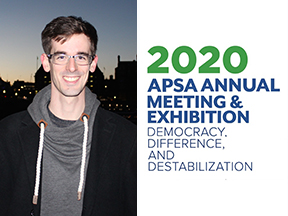
John A. Dearborn’ s dissertation “The Representative Presidency: The Ideational Foundations of Institutional Development and Durability” received both the E.E. Schattschneider Award for best dissertation on American government and the George C. Edwards III Award for best dissertation on executive politics, from the Presidents and Executive Politics section of APSA.
Abstract:
“A central puzzle in American political development is why Congress created the institutional presidency, a set of arrangements that passed to another branch authority that seemed securely vested by the Constitution in the legislature. In answering this question, I set forth specific criteria that can establish the relationship between ideas and political change over time. I show that acceptance of the idea of presidential representation – an assumption that presidents possess and act based on a unique perspective due to their national constituency – was an essential precondition for many of the laws that together constitute the institutional arrangements of the modern presidency. The idea was prominently contested in hearings and debates in Congress. However, innovations based upon this claim pushed against the written constitutional frame.
This project examines and compares the development and durability of laws passed by Congress creating the institutional presidency in five policy areas (budgeting, trade, reorganization, employment, and national security) over two periods of time (1921-1947 and 1973-1983). The first period demonstrates the political efficacy of the idea of presidential representation in supporting institutional reform. The second period shows what happens to reformed institutions when the idea behind them falls out of favor. Laws addressing presidential authority budgeting, trade, reorganization, and employment were specifically influenced by the idea of presidential representation, while national security reform did not rely on this idea. By examining the changing influence of the idea of presidential representation, I provide a fresh understanding of critical episodes in the development of relations between the presidency and Congress.”
John is a Postdoctoral Associate for the Center for the Study of Representative Institutions & The Policy Lab and a lecturer in the Department of Political Science at Yale University.